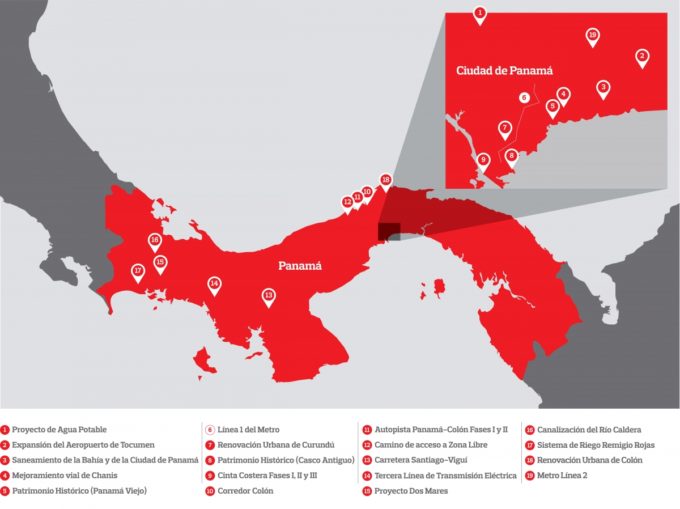
Odebrecht scandal goes much deeper than Uncle Sam
says that it does, fuels growing indignation here
by Eric Jackson
It would seem to be a set of mixed messages in the waning days of the Obama administration. Panama’s former President Ricardo Martinelli was allowed to live in an upscale apartment in Miami, posting taunting Twitter messages aimed back here despite an INTERPOL red letter warrant for his arrest. At the same time the US Department of Justice announced an out-of-court bribery settlement with the giant Brazilian construction company Odebrecht, the consent judgment for which mentioned $59 million in bribes paid to Panamanian public officials, via four unnamed persons, between 2010 and 2014. All of those bribes would have been to secure Panamanian government contracts during the Martinelli administration.
It wouuld all seem readily explicable to somebody who had been a student in one of former professor Obama’s constitutional law classes. One crime does not mean much about another crime, offenses committed in the context of a president’s administration do not necessarily implicate that president, a plea bargain by one person or company does not bind somebody who is not a party to that settlement, there are due process rights in extradition cases and so on. However, a bit of knowledge about the many other corruption cases ongoing in Panama and the ways that the Martinelli administration worked, plus revelations from Brazilian and Swiss government authorities and news media, will inform a reading of the information and plea agreement published by the US Department of Justice. They have denied it, but two of the four unnamed persons cited as having received some of this bribe money appear to be the former president’s two sons. Moreover, it is likely that Odebrecht paid bribes to bag people, with the understanding that they would be passed on to higher officials in the government.
The Varela administration was not helped by Vice President Isabel De Saint Malo’s declaration that it had been a whispered secret for years that Odebrecht was paying bribes to Panamanian public officials. Why, then, with the former CEO of Odebrecht in a Brazilian prison at the time, did the administration she serves promote and secure the passage of a law providing that the findings of foreign courts do not affect the ability of companies to bid on Panamanian public contracts?
Nor did the declaration by Comptroller General Federico Humbert that it was more than $59 million in bribes, with more than four people involved, serve to assuage public doubts that justice would be served. When Odebrecht won the contract for Line 2 of the Metro commuter train system — not on the lowest bid, but on a set of arcane specifications written and judged by among others a former Odebrecht consultant — why did Humbert approve that contract?
Then Attorney General Kenia Porcell held a weird press conference in which she said that she had a “verbal” agreement — whether written or oral she didn’t say, but one would presume set forth in words rather than an unspoken and unwritten tacit deal — that Odebrecht would pay $59 million to the government. Not those who received the bribes? Not repayment just by disgorging the money but also by spending years of their lives behind bars? Porcell would not answer any questions at that press conference, but later, amidst a storm of criticism, she did say that she hadn’t signed any agreement with Odebrecht.
Into the controversy came Proposed Law 245, submitted to the legislature this past September by the presiding magistrate of the Supreme Court, José Ayú Prado. That 58-pager is mostly a lot of housekeeping to implement the relatively new accusatory system of criminal procedure. The old inquisitory system did under very limited circumstances allow for plea bargains but the accusatory system makes this easier and more common. There are good and bad things to say about that, but given that the nation’s prison system is mostly inhabited by people who have been convicted of nothing but are awaiting trial, plea bargaining is seen as a way to clear cases more quickly and cut down on the backlogs on the dockets of the criminal courts. As submitted, the proposal was not controversial.
But into the proposal the National Assembly’s Government, Justice and Constitutional Affairs Committee inserted a new article, Article 22 as the proposal was renumbered. It’s specifically about plea bargains ending cases and related investigations. The proposed new article has not been published by on the legislature’s website — only the proposal before the committee amended it. Leaders of the nation’s principal bar association, the Colegio Nacional de Abogados, and prominent anti-corruption activists have cried foul. They say that, for example, Odebrecht would be able to cop a plea and that would end the investigations and cases against all of its accomplices. The chair of the committee that did that is PRD deputy Quibian Panay and in the committee and in the legislature as a whole it is reported that the new article has solid support from the president’s Panameñista Party. (The committee vote and debate on Article 22 is unpublished.)
That’s not just some weird speculation. Percolating up the Panamanian court system there is a ruling that let a member of the Panama Canal Authority’s board of directors, Nicky Corcione, and 14 co-defendants off on money laundering charges. These were the alleged accomplices of former presiding high court magistrate Alejandro Moncada Luna’s bribes and peculations. A court ruled that the plea bargain that Moncada Luna made to go to prison for five years in exchange for guilty pleas on some of the charges against him, with the other charges to be dropped, meant that all further investigations or prosecutions of the disgraced ex-judge’s partners in crime would be barred. Prosecutors are appealing that.
There has been a firestorm of criticism. The Independent Movement, closely aligned with the Motta family, has broken up its alliance with the Varela administration. The Chamber of Commerce has called for a “crusade” against corruption. The Panamanian Business Executives Association (APEDE) has lent its support for the Chamber and called for a January 26 public forum on corruption. The Kiwanis Club, a stalwart in anti-corruption movements here, has issued a stern statement that includes one of the first and strongest specific demands for legal reform at at time when lawyers are agitating for a new constitutional convention: they want to abolish statutes of limitations for public corruption.
Considering that the first contracts between Odebrecht and the Panamanian government were negotiated a decade ago during the Martín Torrijos administration and that new ones were negotiated under the current administration, full disclosure of Odebrechts’s systematic bribery would likely be a political bombshell to blast away all three major parties. (And take away US statutes of limitations and look at the State of Florida and Miami-Dade County, and you’d see Odebrecht scandals ripping both major US political parties too.)
Administrative Prosecutor Rigoberto González, looking at the various ongoing Odebrecht contracts, has called upon the Housing Ministry, the Ministry of Public Works and the Metro Secretariat to file criminal complaints so that formal investigations of possible bribes related to current contracts can be started. Housing Minister Mario Etchelcu says he won’t do that, Metro secretary and Canal Affair Minister Robeto Roy says he will do that and Public Works Minister Ramón Arosemena isn’t answering that question.
There will be a test of strength of sorts when an ad hoc Committee Against Impunity holds a rally against corruption at the El Carmen Church on Via España on the afternoon of January 25. If hardly anybody shows up then the politicians will surely figure that everything will blow over and they can rig the system so that the takers of Odebrecht bribes are never identified by name and face. But the calls to identify not only those who took outright bribes, but also those who received campaign contributions from Odebrecht, grow louder and more frequent. The Electoral Tribunal’s explanation that campaign contributions are confidential matters that by law they can’t reveal is ever less accepted. And revelations from abroad about Odebrecht crimes in Panama keep coming, notwithstanding Varela’s law that these mean nothing.
Is corruption the law here? It could be. In effect is has been. But now it’s not just a bunch of gadfly lawyers and leftist agitators who are objecting to that. A crisis appears to be brewing.

~ ~ ~
These announcements are interactive. Click on them for more information.










